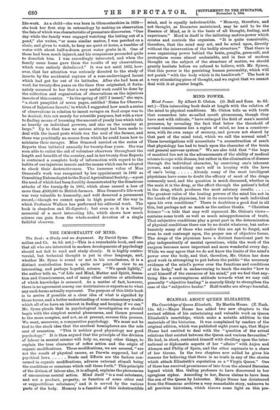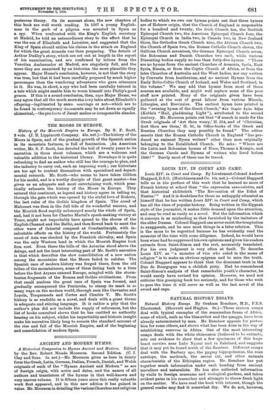The Courtships of Queen Elizabeth. By Martin Hume. (E. Nash.
12s. 6d.)—Major Hume has added two new chapters to the revised edition of his entertaining and valuable work on Queen Elizabeth's courtships, which make a notable addition to the materials of the historian. It was complained by readers of the original edition, which was published eight years ago, that Major Hume had omitted to deal with the "question of the actual relations that existed between the Queen and various favourites." He had, in short, contented himself with dwelling upon the inter- national or diplomatic aspects of her " affairs " with Anjou and Aleneon and Philip of Spain, and the other aspirants to a share of her throne. In the two chapters now added he gives his reasons for believing that there is no truth in any of the stories which attack Elizabeth's reputation as a "Virgin Queen." One of these has received prominence of late from the absurd Baconian legend which Mrs. Gallup professes to have discovered in her egregious cipher. According to her, Bacon claims to have been the son of the Queen by Leicester. Major Hume has disinterred from the Siniancas archives a very remarkable story, unknown to all previous historians, which throws some light on this pro- posterous theory. On its account alone, the new chapters of this book are well worth reading. In 1587 a young English- man in the garb of a pilgrim was arrested in Spain as a spy. When confronted with the King's English secretary at Madrid, he told an extraordinary story to the effect that he was the son of Elizabeth and Leicester, and suggested that the King of Spain should utilise his claims in the attack on England for which the great Armada was then preparing. The details of Arthur Dudley's story, which are set out at length in the report of his examination, and are confirmed by letters from the Venetian Ambassador at Madrid, are singularly full, and the more they are examined by an historian the more plausible they appear. Major Hume's conclusion, however, is not that the story was true, but that it had been carefully prepared by much higher personages than the wandering adventurer who gave utterance to it. He was, in short, a spy who had been carefully tutored in a tale which might enable him to worm himself into Philip's good graces. If this is a sound conclusion, then, says Major Hume, we may agree that all the much more sha lowy tales about Elizabeth's offspring—legitimated by wore., marriage or not—which are to be found in contemporary documents may be set down as equally chimerical,—the products of Jesuit malice or irresponsible slander.



























































 Previous page
Previous page